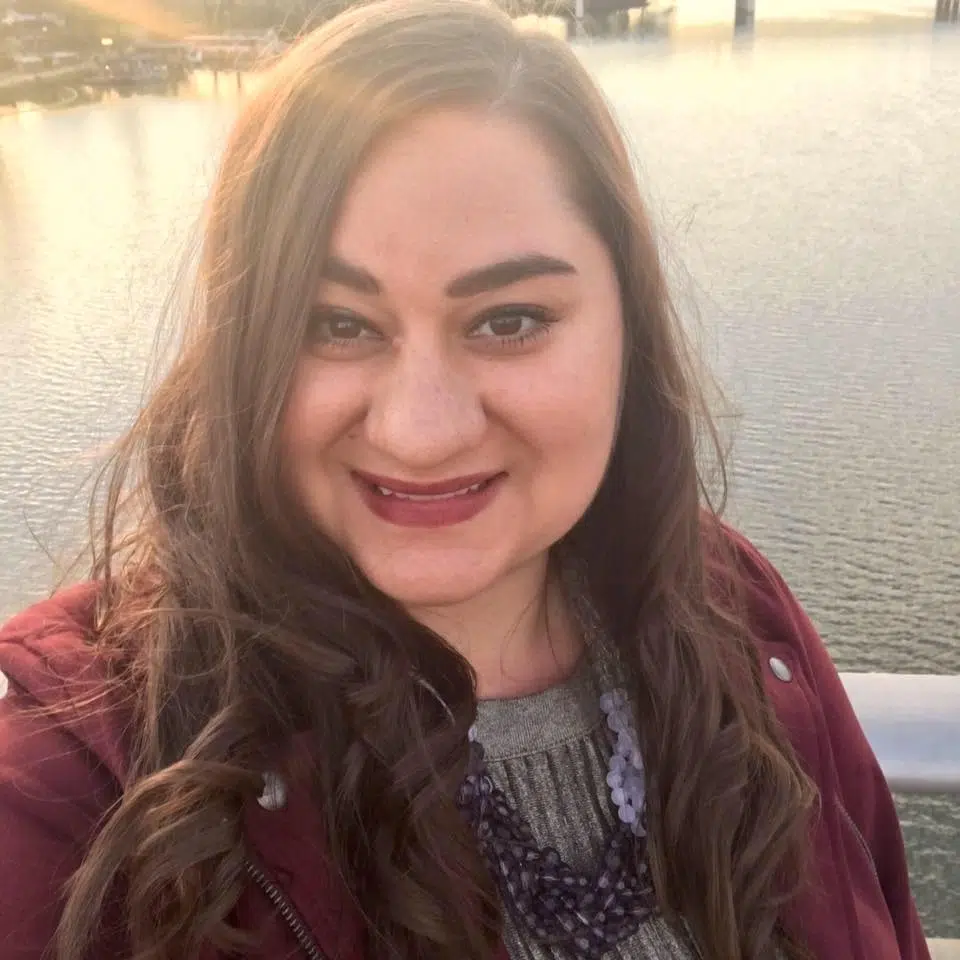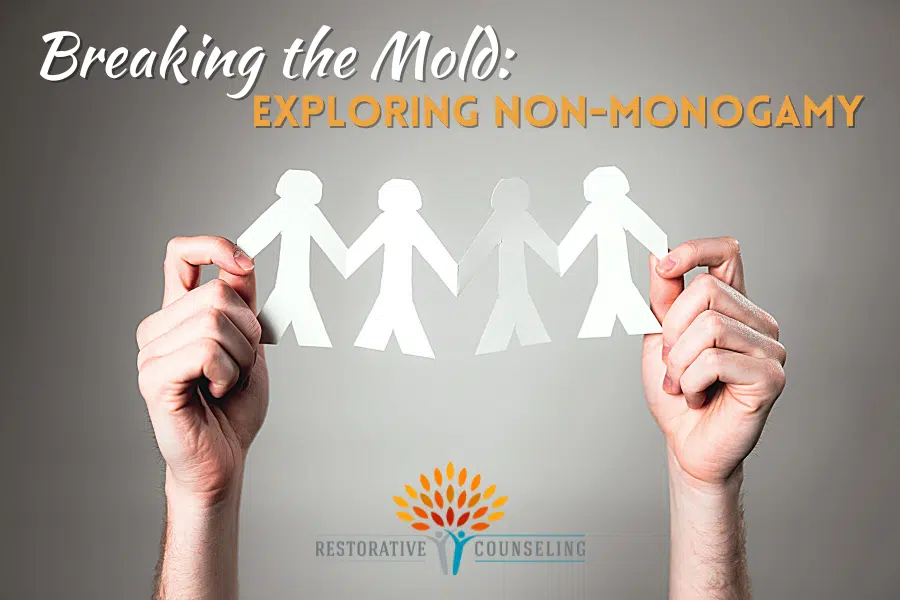Written by Katie Jackson-Griffin, LCPC
When it comes to creating a joyful and fulfilling life, a lot of people crave connection in the form of romantic relationships. Just because people crave these relationships doesn’t mean that it’s always clear how to create them. Thus, it’s natural to turn to various systems to guide them, such as family, peers, culture, religion, and media. Typically, this messaging is heteronormative and focuses on monogamy — a man and woman who have committed to be with only each other. However, romantic relationships are a deeply personal choice and as unique as each person. Not everyone wants or needs the same thing. If the traditional way of being partnered doesn’t work for you, there are other options!
Consider Taylor’s Story
Taylor is a cisgender woman in her first long term, heterosexual relationship. For the majority of her life, she identified as heterosexual and only dated men. Taylor didn’t see a lot of variety in relationships growing up. Typically, she observed men and women in monogamous relationships.
At the beginning, Taylor felt really satisfied with her partner, James. They had a great time going on dates and building a life together. Over time, Taylor started feeling drawn to other experiences.
While reading books, engaging in social media, and listening to podcasts, Taylor began to discover that she was sexually attracted to other genders. Taylor started to realize that she hadn’t let herself consider what it might be like to date people other than cisgender men. She had always believed her feelings and thoughts were “just admiring other genders like everyone does.” But the more that Taylor explored and reflected, she landed on believing that the label pansexual felt “right” and genuine to her.
Taylor began to worry. What did this mean about her relationship with James? She didn’t want to end her relationship, but she also wanted to honor and explore this side to her that she hadn’t been able to before. She considered remaining monogamous and expressing her queerness in other ways, but this didn’t feel satisfying to her. Taylor began to experience anxiety, a desire to isolate from others, and hopelessness.
So, Taylor reached out for help from a therapist. The therapist encouraged her to allow herself to consider other types of relationships that may feel more fulfilling to her such as polyamory or an open relationship. Taylor became more empowered in wanting to give these relationships a try.
Want support exploring different types of relationships?
Similar to Taylor, here are some tips you can use to help you explore non-monogamy:
1. Use open and honest communication
Initially, Taylor was very anxious about discussing her needs with her partner, James. Taylor didn’t want their relationship to end. With the help of her therapist, she realized that she needed to be honest in order to be in a genuine and authentic relationship even if James decided that non-monogamy wasn’t right for him. They participated in couples’ sessions so they could process their feelings together. Both Taylor and James discovered that they were interested in opening their relationship. This led to several discussions about boundaries and ways to make each other feel safe.
Despite the natural fear that can come with being honest, it’s important to honor your thoughts and feelings. The discomfort of speaking your truth will ease quickly. The discomfort of not speaking your mind lasts much longer. Often, assumptions about how someone will react makes it more difficult to speak up. Try to focus only on what you want to communicate and not on the potential reaction from your partner. Don’t be afraid to reach out for support from a couples therapist, similar to Taylor and James, if you’re wanting more support in having a conversation with your partner about opening your relationship.
2. Explore resources about non-monogamy, polyamory, and other types of relationships
There are many smart, insightful people already talking about non-monogamy! It’s important to use these resources for education and also to gain a sense of community. There is still a lot of stigma surrounding non-traditional relationships, such as polyamory and open relationships. Here are some resources to start learning more about non-monogamy:
Books:
- The Ethical Slut: A Practical Guide to Polyamory, Open Relationships & Other Adventures by Janet W. Hardy*
- Opening Up: A Guide to Creating and Sustaining Open Relationships by Tristan Taormino*
3. Listen to your needs
What works for one person might not work for you. For Taylor and James, they discovered that polyamory felt like a good fit for them. They enjoyed dating, forming relationships, and integrating their new partners into their lives. They felt that this expanded their intimacy and fun! Taylor felt fully like herself for the first time. However, not everyone was so supportive. Many of Taylor and James’s family members didn’t understand and would pass judgment on their choices. They thought it was “just a phase” and “amoral.” Taylor and James had to learn to set boundaries when it came to family members sharing their opinions. They had to cope with accepting that other people may not agree, but ultimately it was what made them happy. That’s what matters.
There is very real discrimination that people face when they are not living inside of what society believes is “the norm.” Carrying this additional burden can cause stress. Like Taylor and James, setting boundaries to create a safe environment is key. This might mean making some tough choices about who holds space in your life. Creating a “chosen family” can provide support and community. These friendships can provide positivity and understanding when it comes to expressing your sexuality and relationship needs.
Ultimately, it takes courage to live your authentic self and explore non-monogamous relationships. The path to get there can be challenging. Relationships are often complex, even without the added stress of societal and family pressure to conform to certain norms. It’s okay to be afraid, confused, or worried. You don’t have to do it alone.
Restorative Counseling is here to help you explore non-monogamy and other types of relationships
Restorative Counseling can assist if you are struggling with your sexuality or finding fulfillment in your relationships. It can be difficult to talk about these topics with family and friends for fear of judgment and stigma. We’re here to provide a safe space for you to discover all of your options when it comes to building intimate connections. To get started, schedule an appointment today!
*Heads up: this page includes affiliate links. If you use these links to make a purchase, a small commission may be earned at no extra cost to you. Restorative Counseling only endorses items that have been personally used or come highly recommended by trusted peers.

Hi, I’m Katie!
I use HAES and DBT approaches to help people overcome their challenges with low self-esteem, anxiety, and depression. Read more about me.
Follow Restorative Counseling
Sign up for our newsletter

